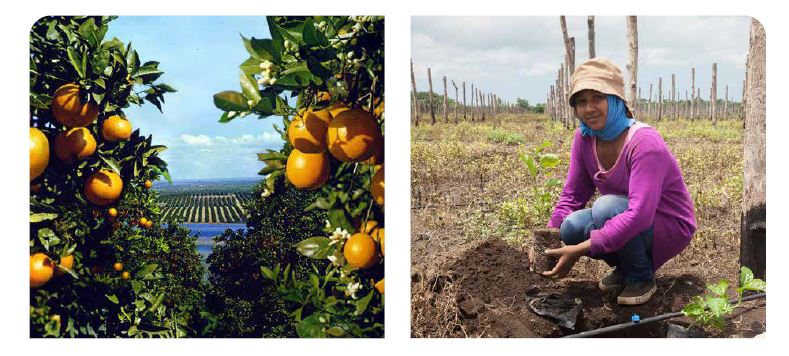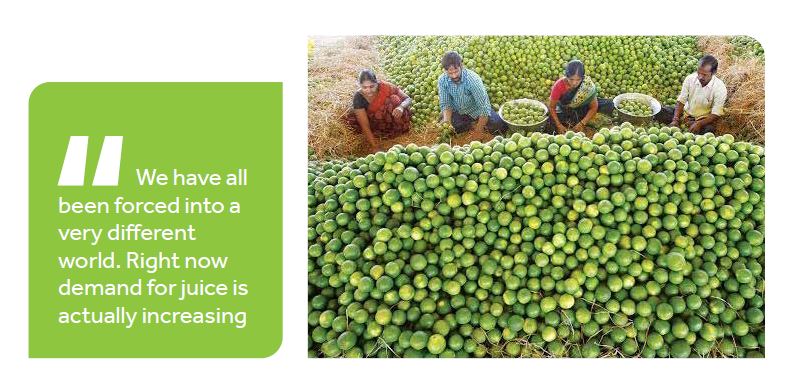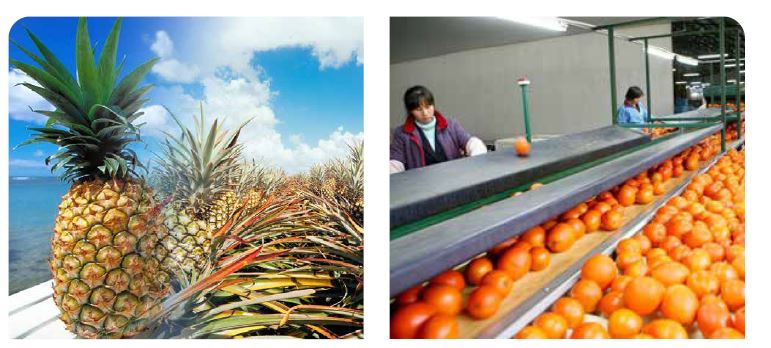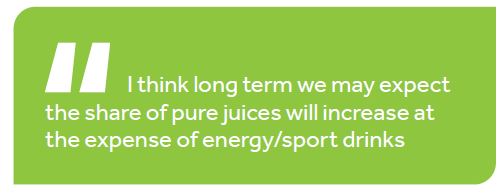
ALGERIA
Slim Othmani, President of NCA-Rouiba in Algeria
We have almost stopped our production lines and have reduced the distribution coverage (many geographical areas non accessible). We couldn’t afford credit to our customers. It was almost impossible for us to pay our suppliers and also our banks.
Many of our suppliers have put on hold their operations. We are trying to work with the local drink producers association to get the right support from the government to overcome all the issues we are facing.
Due to the perception that juice is a healthy product, most probably we will witness a boom in juice consumption mainly fresh or NFC when this is all over. Are we going to be able to outsource all the fruits needed to support this? Does this mean major changes in production equipment? Is it the end of recipes with preservativeadded?
We will witness fast digitalisation and robotization of all the supply chain and many boring jobs will most probably disappear as a result of this crisis.
INDONESIA
Yos Putra Surya, Senior Account Manager, PT Great Giant Pineapple
Since second half last year, the processed pineapple market has already started to experience an upward trend mainly due to shortage of supply in Thailand, the main country producer. However, for pineapple juice concentrate, there are some inventories available in Europe from preceding over supply period, which hold the market price from increasing sharply like what has happened in the canned pineapple market.
The COVID-19 outbreak in Europe, has brought additional pineapple juice demand and thus reduced those inventories considerably. As a result, the present market price has climbed to USD 2,300-2,400/MT FOB for PJC 60brix. Since forecasted supply for processed pineapple will remain short, at least, till next Thai summer crop in 2021. It will be no surprise to see previous historical high market price level repeat itself in the coming months.
The Ministry of Industry has issued a circular that provides guidelines on how factories should operate during the current COVID-19 pandemic. The Circular Letter No. 4/2020 on Factory Operations amidst the COVID-19 Public Health Emergency is aimed at supporting industries in continuing their operations with the established healthcare protocols, which include screening workers by measuring their body temperatures and restricting the number of workers in public facilities such as mosques and canteens. In general, our government has taken the necessary steps and measures to contain covid-19 outbreaks. One approach is a limited lockdown to particular region/red zones areas.
To give strength to the industry longer term, the juice industry needs to reinvent itself and its image as a provider of antioxidants and multivitamin drinks which everyone can benefit from. Aside from traditional juices like apple, orange and pineapple, an innovation of combined fruits and vegetable drinks will be even more attractive for consumers who look for healthier and a less sweet drink.
For the future – since this pandemic period will last for months, so consumers are forced to be more selective in their spending and eventually look for basic need items especially the ones which can offer longer shelf life, and juice is among their options during this period of time. The consumers’ memory of current pandemic threats, their buying & consumption behaviour during this period of time will have profound influence to their future buying selection/choices, not only current generation but few generations to come.

US
Lukas Oest, Head of Global Marketing Development, Florida Worldwide Citrus
For Florida Worldwide Citrus, one of the biggest changes the current virus has made to our business is related to our operations and company culture. We are a family-owned operation that prides itself on efficient and high-quality service. To continue providing such service in the midst of this pandemic, we have split our team into two shifts with rotating days in the office and working remotely. We quickly had to adapt to new operational procedures and channels of communication. It has been a welcomed challenge for us.
Located in Southwest Florida, our company is grateful for the community resources we have available to us including the Bradenton Area Economic Development Corporation, local chambers of commerce and the Small Business Development Centre. All have done a fantastic job communicating available help to businesses like ours.
SOUTH AFRICA
Anton Reinecke, MD, Ceres Fruit Processors (Pty) Ltd
Fortunately we are allowed to continue working under our lockdown rules due to being an essential food service. The biggest impact is on deliveries to cider manufacturers, which have been hugely delayed, because no alcohol sales are allowed in SA during lockdown. Also, banks are more cautious, so this may affect facilities. I am unsure of the impact of lockdown on consumer behaviour. Less socializing – less alcohol, but perhaps juice consumption will increase in general as a result.
SWITZERLAND
Frank Hofer, CEO Frutco
It is indeed a very difficult time. Around our Frutco Team, we see many SMEs suffering. All the businesses which are not primary care are closed with tremendous consequences for the staff and owners. The Swiss Government is helping where they can, but even with this help, it is tough for the economy. Nearly 30% of the employed people are in short-time work.
Doubts and uncertainty is gnawing on the souls. We believe that this situation will follow us the whole year until we come back to normal. But then the world has changed.
Frutco went very well prepared into the crisis. Since end of January we activated the Pandemic Plan and everything was tested and trained again. It is now more than 3 weeks that the whole team is working from home offices. Only one person per office building is present to do the work, which cannot be done virtual. We have separated our storage in different warehouses in Holland, so that we will always be able to fulfil our supplies, in case one of the warehouses should get contaminated.
On the other hand our investment in Latin America got postponed by about a month, due to a shutdown ordered by the Colombian government. Nevertheless, up to now in none of the countries in which we are working any problem with regards to affected workers in the processing or on the farms has occurred. The farms are working normal and people keep the rules of social distancing.
The food service sector is down a lot. In our case, the food service people are supporting the bulk container business. On the other hand we have seen a huge upturn for these customers who are using our ingredients for health claims.
Some customers in Italy filled their stocks, to keep the ability to deliver. Not clear until is the question will the supply chains stay stable. We don’t know how the crisis will affect Latin America. Some irregularity of deliveries and late payments are seen but most of the businesses are running more and less normal.
We had to increase the working capital in order to prolong some payment terms for customers in very much affected regions, in collaboration with the credit insurance company and approved 2nd or 3rd suppliers. We believe that we may keep the budget 2020 as long as the supply chains are up and running. Some containers are short but our team could solve these problems always on time.
The team is missing the social contacts within Frutco and the physical contact with suppliers and customers. Today everything goes through Skype.
At the end of the day, when the crisis is over I don’t believe that there will be a change how the public sees fruit juice beverages. The sugar discussion will come up again. Therefore we are working on solutions which will match this issue and will help to demonstrate the value of a good fruit juice. All our research work stays on track und soon our banana fibres will be ready to enter the market.
US
Remer Lane, Investments in Juice businesses, M&A, Strategy and Sustainability Solutions
My business has improved. While socializing is down, the companies with whom I deal are looking for improved financial conditions; supply chain solutions for delayed or alternative suppliers; considerations for new technologies that address sustainability, AI and automation. In regards to the virus, we have accommodated the requests to reduce movement and thus infections. That has worked and we have no issues with government activities to-date. Where might you see the juice industry in 12 months’ time? The juice industry has an opportunity now to increase its profile as providing the right nutrition at the right time. Sugar consumption seems to be off the radar and vitamin intake more important. We need to build on that. Increased consumption of vitamin rich 100% juices especially OJ is likely. We need to launch a marketing campaign immediately to promote the role vitamins supplied by juices play in maintaining a healthy lifestyle and giving our bodies the right nutrition to fight virus’.
US
Steve Cockram, General Manager, Growers Co-op
Grape Juice Co We have all been forced into a very different world. Right now demand for juice is actually increasing. Now that it seems that the food and transportation industries have been deemed to be essential, so we can stay open. The big short term fear is the health of our employees. One sickness and we may be shut down for a couple weeks. Long term, we wonder how to do harvest if COVID is raging in our area. Farmers will have the same issues as processors in getting healthy people to stay in operation.
The northern hemisphere wants to see how the southern hemisphere is dealing with it now. That said, our federal government is throwing forgivable loans to small businesses, so that will be a nice financial boost, if it comes to pass.

SLOVENIA
Štefan Gradišek, Head of Purchasing Department, Dana
Seeing longer delivery dues, higher transport costs. In some cases higher raw material prices and in rare cases also unavailability of material. We stopped production for a short period of time, in order to reduce threat of virus expansion to the minimum among employees. From a sales point of view, we had a lack of sales, since all restaurants etc. are closed, and this represents an important part of our business.
There is some governmental support for producers /employees and looks positive.
In my opinion, in 12 month things will be more or less on old tracks. Unless there is a resurgence of the virus. I do not really any positive things to say as a result so far.
US
Carol Plisga, independent consultant to the food and beverage industry
In my opinion, the juice industry is in the same predicament as all other industries and governments. As much as we would like to look long term, the future changes daily so righ now what matters is fighting front line challenges and embracing immediate needs.
I’m not a historian but common sense tells me that a spike of any kind is not sustainable and eventually will moderate. Looming out there for all of us both personal and professional is a recession caused by COVID-19. How many businesses won’t survive?
Forecasting is a tool that depends on previous history and future insight. We have nothing in history to compare as a forecasting tool. The future for retail and foodservice is unknown. We can’t expect all countries will come back at the same speed with the same demands on the juice industry.
We’re in a crucial agricultural period for Southern Hemisphere. If unable to pick, process and ship – we will see shortages globally. Does that automatically kill the spike we are seeing now or will the recession kill the spike? I am looking forward to your report in FJF issue. We can all learn from our colleagues and your span of clients is far greater than any one of us has, as a single individual or company.

POLAND
Mateusz Świętanowski, Concentrates, IQF & Puree Sales Manager / Kierownik Działu Koncentraty, IQF i Przeciery
We have seen a large drop in food service channel sales but at the same time increase in retail based sales channel. Unfortunately we cannot estimate if this trend will continue for the next months as we think that that increase is a result of the stock renewal of supermarket channels. Some challenges with finance and insurance companies as they are looking more closely and in more cautious manner in terms ofproviding finance cover for clients. Most of our team are working from home, utilising all possible platforms of contact with other team members and clients.
Government prepared a lot of projects for businesses across the country, but the scale and results we will notice in near future. We must focus to keep the business running and cover the cost.
As for 12 months’ time – too far to tell now. Let’s not plan too much. Just look at what is happening now and how irrelevant all planning may be. I do however think high vitamin content in juices as well as other minerals might turn out to be substantial factor for rise in consumption. Add to that long shelf life and protection of product from potential contamination as opposed to fresh fruits and vegetables.
ISRAEL
Ido Frank, Director of Business Development, Kibbutz Gan Shmuel, Trisun
So far the biggest change we see is increased difficulty in shipping goods (and also samples to some countries). A few countries have closed down so it is also becoming more difficult to get bookings for containers to move goods.
POLAND
Andrii Humenchuk< Global Sales Specialist, Sambor
What is the biggest change the current virus has made to our business right now – we switched to shorter payment terms and delivery spread (3-10 days net or 100% prepayment and delivery spread max till June 2020).
We have major factors at the moment in Poland: a) shortage of labour as many seasonal workers left the country b) lack of precipitation/high temperature in May forecast. It may result in higher labour cost and lack of apples for processing.
I think long term we may expect the share of pure juices will increase at the expense of energy/sport drinks.

NIGERIA
Anthea Omoregbee, CEO, Zest4Life, Lagos Nigeria
We are in a lockdown now so delivery is slow due to no movement, resulting in reduced sales.
Not seeing support from government in our region as yet.
For the future I can see more online sales and with the help of vitamin C, which helps with building immune systems, the sales of juices are and will continue to rise.
Hopefully we can play a part in helping to boost immune systems.
PAKISTAN
1.0 The Scope of the Crisis (various sources)
As has been widely recognised globally, the current crisis, in addition to its tragic human dimension, represents an economic shock, on a magnitude which has not been seen since the Second World War. In the case of the economy of Pakistan, which is between 30 & 35 in the world GDP ranking, both its linkage to the global economy, as well as its relative isolation, are kept in view when assessing international trends.
The major linkage is in the numbers of workers from this country in the Gulf, which can be estimated at over 5 million, followed by those in the UK/ USA/ Europe. The financial implication is the volume of remittances to this country, which actually constitute the biggest single source of foreign currency, and, on a micro level, which are mostly utilised for personal consumption by the recipient families.
2.0 Implications for the Fruit Juice Sector
Actually the sector may be considered as consisting of two sub-sectors:
i) The production of industrial products such as concentrates and purees: these are currently used mainly for consumer juices for local sale, with some proportion for the export market. The availability of disposable income for packed fruit juices will directly impact the manufacturers of industrial products. However, since these manufacturers have been making high profits from local sales, with a decline in demand it is possible that they will make more an effort to export, so the reduction in sales to local juice producers maybe partially offset by increased export sales, albeit at somewhat lower prices.
Current exports are no more than 4-5,000 tonnes/year of mango/guava purees, and about 10,000 tonnes/ year of mandarin concentrate, so it is conceivable that these levels can be increased by 40 to 50% to offset the decline in local sales, as forecast in ii) below.
ii) The production of consumer juices: in response to the economic contraction expected in the coming future, decline in the volume of consumer juice sales is the likely scenario, since this is not an essential survival item of the grocery basket. The buoyancy in the polices of the multinationals, such as Pepsi/ Coca Cola/ Nestle, as well as that of the leading local brands, towards constantly expanding their fruit juice portfolios, is not realistically expected to be sustained in the immediate future.
The current consumer juice market in Pakistan, with a range of products in various sizes (200 ml/ 250 ml/ 1 litre) and types (PET/ tetra + similar/ glass) is estimated at between 300 & 500 million litres/ year. Growth has been phenomenal in the last few years, estimated by authoritative sources at reaching 20% annually in some years, powered by increasing disposable incomes/ changes in tastes & lifestyles/ a growing young population and other factors. However, quite clearly, such growth is not expected to happen in the next few years, following the current economic shock.
FINLAND
Elisa Piesala, Branch Manager, Finnish Food and Drink Industries´ Federation, Helsinki
In Finland the food sector is considered as a sector critical to the functioning of society.
Pre-primary education organized in schools and contact teaching for grades 1–3 will continue for the children of parents working in sectors critical to the functioning of society. Other schools and universities are closed. People are asked to stay at home and avoid close contact to others.
Impact on sales – As elsewhere, the sales in the groceries have increased and the sales in the foodservice have reduced a lot. Bars and restaurants have been closed since last Saturday (4.4.). Some examples of rough estimations of increases in the groceries: meat + 40 %, dairy products 20-30 %. The highest peak of groceries sales was right afterthe Finnish government announced of enforcing Emergency Powers Act (on the 16th of March). The retail sector reported that now the situation has evened out, but still people are buying more than in usual situation e.g. bread, meat, tissue paper, canned food, soap and detergents.
Transportation, logistics, border checks – The Food and Drink Industries’ Federation has not yet been reported of major problems with border checks so far.

